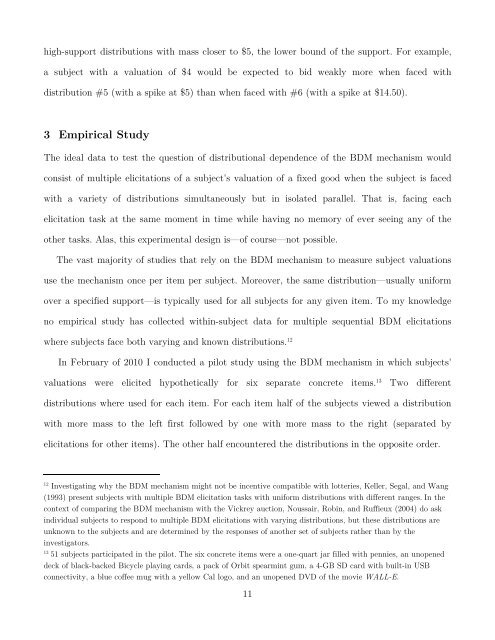Testing Distributional Dependence in the Becker-DeGroot-Marschak ...
Testing Distributional Dependence in the Becker-DeGroot-Marschak ...
Testing Distributional Dependence in the Becker-DeGroot-Marschak ...
You also want an ePaper? Increase the reach of your titles
YUMPU automatically turns print PDFs into web optimized ePapers that Google loves.
high-support distributions with mass closer to $5, <strong>the</strong> lower bound of <strong>the</strong> support. For example,<br />
a subject with a valuation of $4 would be expected to bid weakly more when faced with<br />
distribution #5 (with a spike at $5) than when faced with #6 (with a spike at $14.50).<br />
3 Empirical Study<br />
The ideal data to test <strong>the</strong> question of distributional dependence of <strong>the</strong> BDM mechanism would<br />
consist of multiple elicitations of a subject's valuation of a fixed good when <strong>the</strong> subject is faced<br />
with a variety of distributions simultaneously but <strong>in</strong> isolated parallel. That is, fac<strong>in</strong>g each<br />
elicitation task at <strong>the</strong> same moment <strong>in</strong> time while hav<strong>in</strong>g no memory of ever see<strong>in</strong>g any of <strong>the</strong><br />
o<strong>the</strong>r tasks. Alas, this experimental design is—of course—not possible.<br />
The vast majority of studies that rely on <strong>the</strong> BDM mechanism to measure subject valuations<br />
use <strong>the</strong> mechanism once per item per subject. Moreover, <strong>the</strong> same distribution—usually uniform<br />
over a specified support—is typically used for all subjects for any given item. To my knowledge<br />
no empirical study has collected with<strong>in</strong>-subject data for multiple sequential BDM elicitations<br />
where subjects face both vary<strong>in</strong>g and known distributions. 12<br />
In February of 2010 I conducted a pilot study us<strong>in</strong>g <strong>the</strong> BDM mechanism <strong>in</strong> which subjects'<br />
valuations were elicited hypo<strong>the</strong>tically for six separate concrete items. 13 Two different<br />
distributions where used for each item. For each item half of <strong>the</strong> subjects viewed a distribution<br />
with more mass to <strong>the</strong> left first followed by one with more mass to <strong>the</strong> right (separated by<br />
elicitations for o<strong>the</strong>r items). The o<strong>the</strong>r half encountered <strong>the</strong> distributions <strong>in</strong> <strong>the</strong> opposite order.<br />
12 Investigat<strong>in</strong>g why <strong>the</strong> BDM mechanism might not be <strong>in</strong>centive compatible with lotteries, Keller, Segal, and Wang<br />
(1993) present subjects with multiple BDM elicitation tasks with uniform distributions with different ranges. In <strong>the</strong><br />
context of compar<strong>in</strong>g <strong>the</strong> BDM mechanism with <strong>the</strong> Vickrey auction, Noussair, Rob<strong>in</strong>, and Ruffieux (2004) do ask<br />
<strong>in</strong>dividual subjects to respond to multiple BDM elicitations with vary<strong>in</strong>g distributions, but <strong>the</strong>se distributions are<br />
unknown to <strong>the</strong> subjects and are determ<strong>in</strong>ed by <strong>the</strong> responses of ano<strong>the</strong>r set of subjects ra<strong>the</strong>r than by <strong>the</strong><br />
<strong>in</strong>vestigators.<br />
13 51 subjects participated <strong>in</strong> <strong>the</strong> pilot. The six concrete items were a one-quart jar filled with pennies, an unopened<br />
deck of black-backed Bicycle play<strong>in</strong>g cards, a pack of Orbit spearm<strong>in</strong>t gum, a 4-GB SD card with built-<strong>in</strong> USB<br />
connectivity, a blue coffee mug with a yellow Cal logo, and an unopened DVD of <strong>the</strong> movie WALL-E.<br />
11


